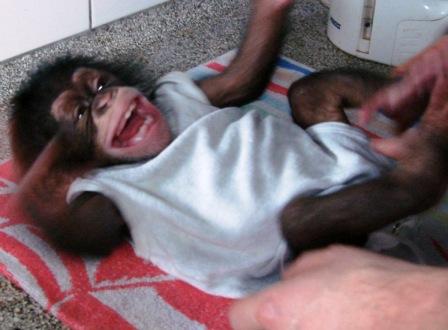
"When I put ice cubes in their butt, they bleat like goats, their balls swinging like church bells in an old village." Thus croons a Mexican prostitute, as she cheerfully pantomimes these sexual techniques, while sitting gaily on a cot, in Michael Glawogger's documentary Whore's Glory. One of the most appreciated features at the recent Thessaloniki Documentary Film Festival, this film offers an inside look into prostitutes' lives in three countries: Thailand, Bangladesh and Mexico. The film begins with shots of pretty Thai women behind glass booths as grinning men bid for them, then segues into a Bangladesh brothel, where women are enclosed in a dark alleyway, with a moody humid sky behind them, the Imam's call for evening prayers rising in the distance. It ends with the Mexican women, who pretend to enjoy their craft, in what looks like a Western film set, replete with dusty abandoned Mexican streets.
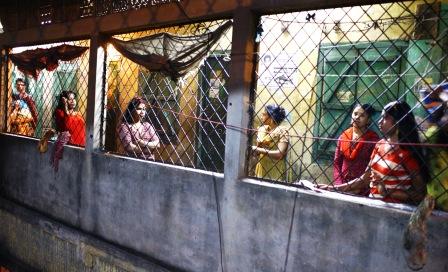
What makes this film engrossing is not the exotic locales -- each filmed by cinematographer Wolfgang Thaler in sensuous detail -- but the frankness of the women as they open up to the camera, including many heartbreaking moments, such as one when a Bangladeshi woman, slumped on her bed, asks: "Why do women have to suffer so much?" The stories are bearable -- in fact, even enjoyable -- to watch mostly because of the cool Western music soundtrack (eg., CocoRosie and PJ Harvey): an ethically questionable choice, as after a while, lulled by the music and colors, it is as if we are watching a music video, or, as my colleague Ninon Pradel noted, as if we are taking a pleasurable ride ourselves in sex tourism. Thai women seem the happiest (girlishly laughing in karaoke bars, as if they are on a romantic date), the Mexican women the most creatively audacious.
Another ethically questionable choice is the fact that the prostitutes were paid to be in the film, a choice which the filmmaker ably defended at his press conference at the Thessaloniki film festival ("documentary subjects should be paid," he asserted). By paying them, he even was able to film an actual sex scene with a John: like Peeping Toms, we watch as the prostitute curtly announces prices for each sexual act -- and then performs, in an almost humorously perfunctory manner -- each one. The film ends with a depressing shot of two Mexican women indulging in cunnilingus, in a drugged stupor.
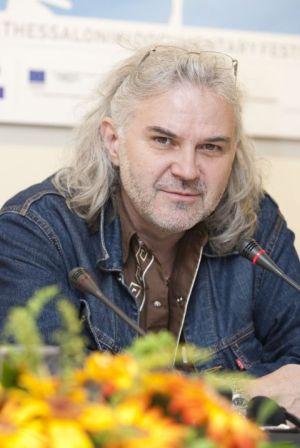
Director Michael Glawogger at Thessaloniki (courtesy of www.motionteam.gr)
The Thessaloniki Documentary Film Festival in Greece, which happens each March, is the most important in southern Europe: open to the public and attended by thousands, it screens an impressive range of films such as Glawogger's, each selected by director founder Dmitri Eipides, "to inform, sensitize and mobilize the audience about critical issues." It also offers documentary directors a chance to network at daily events and cocktail parties in the fancy Electra Palace hotel -- and a chance to eat delicious olives! Luckily, despite the economic crisis in Greece, this festival is still going on, thanks to a grant from the European Union.
While a good number of the films are -- like Whore's Glory -- devastating glimpses into global issues, a fair amount inspire us to believe in idealistic missions. Lion Souls is one of the best of the genre, about an Italian doctor who singlehandedly runs a surgery ward in Zimbabwe. We wait in suspense as a young man, paralyzed by a bunch of thugs who beat him up, waits for his operation by the noble doctor, his only chance to ever walk again.
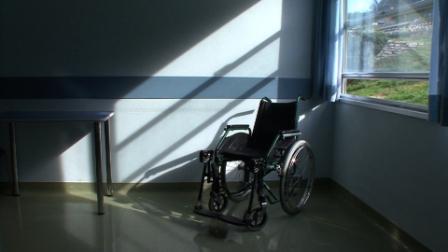
Another inspiring doc is Julia Ivanova's Family Portrait in Black and White, about an under-class woman in Ukraine, who foster-homed and raised 12 black orphans, with both heroism (she creates a real home, protecting these children from their racist environment) and understandable human foibles (she withholds from several the opportunity to be adopted by upper class caring Italians). There is also the quirky South Korean film Planet of Snail about a love story between a midget and a deaf-mute man, both lonely until they found each other.
And for those who need to believe that injustice does not always get the last word, we have Anthony Baxter's You've Been Trumped, which follows the unbalanced battle between developer Donald Trump, determined to build a golf course on Scottish soil, and local inhabitants, whom Trump wants deposed from the land, so their ramshackle homes won't be eyesores to the golfers. The film features the threatened Scots in their supposedly ugly "slum" homes, showing us that these poor riffraff, as Donald Trump perceives them, are actually quite jolly and content, despite their meager means. One Scottish woman gazes fondly at her white chickens: "They're just lovely!" Another inhabitant waxes about his forefathers who, like he, were salmon fishermen in these waters.
In contrast, Donald Trump and his entourage come off as fools, as they hold a press conference on a bluff with Scottish bagpipe players, in full regale, flanking the speakers to give local color. Trump is not afraid to sound obnoxiously patrician: "Forbes lives like a pig!" he announces, speaking about his primary Scottish opponent, Michael Forbes, whose shack would, in his opinion, distress the wealthy clients who come to play golf and not see such horrors.

"I don't approve of bullying," opines Scottish rebel, Dr. David Kennedy, who holds an honorary degree from Robert Gordon University, who, upon learning that Trump has just been honored with the same degree, decides to return his own, with "not wanted" scrawled on the diploma. Due to efforts such as Kennedy's, and that of the local "Tripping Up Trump" campaign, there is a happy ending to this battle against the rich and powerful.
Happy endings are not always the case. A provocative film is Cartography of Loneliness, about widows in Nepal, India and Afghanistan, detailing their horrific ostracism and difficult conditions. In India, for example, widows are not allowed to eat garlic and onion, as these are erotic foods, and eroticism is taboo for widows. The greatest thing widows can hope for in life, we learn, is death: moksha, a release from bad karma. Director Nocem Collado tempers the bleakness of the subject with a spotlight on the charitable organizations that militate to help these women, who are "legally and socially dead", such as WHR, the organization for Women for Human Rights. We watch as these widows eat dhal together in one of these WHR shelters, relieved to have a place where they are accepted.
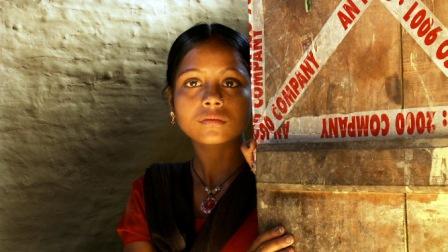
We also have films about personal journeys, such as the low-key Greek film, Sayome, which focuses on a charismatic Japanese woman, long-time immigrant to Greece, who decides to go back and visit with her strangely divided family. As Sayome travels to see her sister and father, she has to re-learn codes of behavior that she has forgotten from her sojourn abroad, such as the fact that Japanese do not hug each other on greeting. The film ends with cultural integration: a Greek meal with sushi.

Another personal journey is Bobby Jo Hart's I Am Not a Rock Star, about a prodigy piano player from Canada who masters all the concerts in her youth, coached by her obsessed father, a would-be professional violinist himself, only to burn out at one concert in London. We watch as the young woman, student at Juilliard, develops a sense of her own consciousness as an artist. The film concludes with a spectacular concert where she does a duo with a little girl, very much like she herself once was, spurred by her idea that music is a gift to share.
Some documentaries appeal to one's curiosity. For example, what ever happened to the descendents of the Nazi party? Chanoch Ze'evi's "Hitler's Children" follows the offspring of the masterminds of the Nazi ideology, such as Rudolph Hess, who apparently all feel great shame. The son of Hans Frank, governor-general of occupied Poland (aka "The Butcher of Poland"), now militates against his own father, by going around high schools in Austria, to remind children that is is possible (and sometimes good) to dislike one's own parents. "Thankfully my father was hung," he said. "So I could avoid being brainwashed." The grand-niece of Himmler admits she and her brother had themselves sterilized not to continue the family genes. The grandson of Hess goes to Auschwitz, to see the "gate" that he had seen in a photo of this family home, a gate that divided the family idyll from the camp next door. He learns that his parents, as children, played on swing sets built by the concentration camp victims. His grandmother would wash the strawberries for the family dessert because they were covered in ashes from the crematoriums. The visit concludes with teary grandson Hess meeting the Jewish grandchildren of Holocaust survivors, with touching hugs to follow.
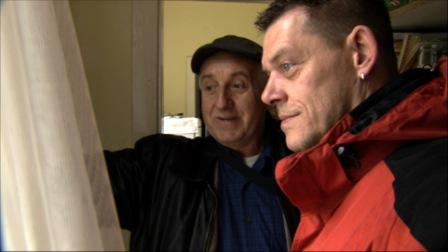
Rudolph Hess' grandson
A particularly moving niche film: Nicole Horanyi and Heidi Kim Andersen's Au Pair, about the situation of Filipino maids in Denmark. The doc follows the personal lives of three Filipino young women, who have chosen to work at low wages in Europe (i.e., "au pair"), to support their families back in the Philippines. As I am personally familiar with the Filipino community in Paris, I was curious to see that the same conditions are true in Denmark: it is the norm for Filipinas take care of European children, while not having a chance to see their own back home. The role of the Church is central to keeping up their spirits and community. "God will provide" is a constant refrain.
The winner of the festival: Gustav Hofer and Luca Ragazzi's Italy: Love It or Leave It. This lighthearted flick features the two directors, a gay couple, travelling through their native country to discover all its ills, from toxic waste to Berlusconi lovers to the Mafia. While the journey through Italy remains a series of snapshots -- kind of like a Wikipedia glance into "what is wrong with Italy today" -- it certainly was a crowd-pleaser, especially for Greeks, who must be relieved to have the attention off their crisis for a couple hours.
Not surprisingly, a number of the Greek films featured offered a perspective on their horrific economic crisis. One of the best is the film Krisis which gives a nut-shell version of the crisis, based in a historical overview. The bottom line is that the bankruptcy resulted from the exaggerated increase in the public sector, for which both the government and the compliant populace are responsible. This documentary's slant is one that I heard repeated from Greeks I would meet around the city, in bus stations and in restaurants: "We deserve what happened," said one young man pleasantly. "The politicians made terribly wrong choices," said another.
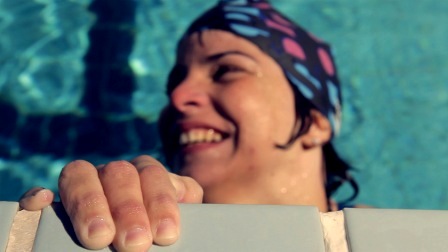
No, to answer the question everyone asked on my return from Thessaloniki, the Greeks did not seem particularly downtrodden this year--and as usual, had an amazing sense of hospitality and humor.
In fact, we shouldn't forget a sense of humor during this panorama of human experience. Jacques Mitsch's "The Natural History of Laughter" explores how laughter is biologically wired in us, with an evolutionary purpose. Through interviews with leading "laughter" experts -- scientists Jan Von Hoof, Robert Provine, and Jakk Panksepp -- the director teaches us that laughter has a necessary purpose, to help us feel closer to the people around us and constitute groups. Laughter, in fact, is a distinguishing trait of all mammals. Even rodents laugh -- although we can only hear this laughter (Panksepp demonstrates with wires tapped on a rat's chest) with ultrasound.
